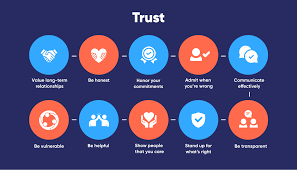In today’s fast-paced digital world, establishing and maintaining trust is paramount for success, whether it’s in personal relationships or in the business realm. Trust is the cornerstone upon which strong relationships are built, and this fundamental concept transcends industries and borders. In this comprehensive guide, we will delve deep into the importance of trust and how to cultivate it in both your personal and professional life.
Why Trust Matters
Trust in Personal Relationships
In our personal lives, trust is the bedrock of all healthy relationships. It’s what makes us feel safe, secure, and loved. Trust in personal relationships is about honesty, reliability, and dependability. When we trust someone, we open up to them, share our thoughts, feelings, and vulnerabilities. This mutual trust fosters emotional intimacy and genuine connections.
Trust in Business
In the business world, trust is equally crucial. Customers, clients, and partners must have confidence in your brand or services. Without trust, your potential customers may never convert, your clients might look elsewhere, and your partners may doubt your commitment. Building trust in business is the key to customer loyalty, repeat business, and long-term success.
The Elements of Trust
Trust is not an abstract concept; it’s built on specific elements and actions. Here are some critical components of trust:
1. Transparency
Transparency is all about being open and honest. In personal relationships, it means sharing your thoughts and emotions. In business, transparency involves clear communication about your products, services, and practices. Transparent companies tend to build trust more rapidly.
2. Consistency
Consistency is vital in both personal and professional contexts. In personal relationships, being consistent means being reliable and predictable. In business, consistency means delivering high-quality products or services consistently over time. This reliability fosters trust.
3. Integrity
Integrity is non-negotiable. It’s about doing the right thing, even when no one is watching. In personal relationships, integrity builds respect. In business, it is the foundation of a strong reputation.
4. Competence
In the business world, competence is crucial. When customers and partners see that you’re skilled and knowledgeable in your field, their trust in your abilities grows. Competence leads to confidence.
Building Trust in Personal Relationships
Communication
Open, honest, and empathetic communication is the bedrock of trust in personal relationships. Make an effort to actively listen, express your feelings, and show empathy towards the emotions of others.
Reliability
Being dependable and keeping promises is essential. It shows that you can be counted on, creating a sense of security and trust.
Vulnerability
In personal relationships, allowing yourself to be vulnerable is a sign of trust. It demonstrates that you are comfortable sharing your innermost thoughts and feelings with someone.
Empathy
Empathy is the ability to understand and share the feelings of others. It is a powerful tool in building trust, as it shows that you genuinely care about the well-being of others.
Building Trust in Business
Exceptional Customer Service
Providing excellent customer service is one of the most effective ways to build trust in business. Respond promptly to inquiries, address concerns, and exceed customer expectations.
Consistent Quality
Consistency is key. Delivering high-quality products or services consistently will establish your brand as reliable and trustworthy.
Honesty in Marketing
Avoid deceptive marketing practices. Be transparent about your products and services, and make sure your marketing materials accurately represent what you offer.
Strong Online Presence
In the digital age, a strong online presence is vital. Positive online reviews and a well-maintained website can significantly boost your business’s trustworthiness.


